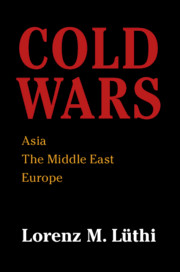Book contents
- Cold Wars
- Cold Wars
- Copyright page
- Dedication
- Contents
- Maps
- Acknowledgments
- Note on Names, Transliterations, and References
- Abbreviations
- Introduction
- 1 From High Imperialism to Cold War Division
- Part I Elusive Unities
- Part II Asia
- Part III The Middle East
- Part IV Alternative World Visions
- Part V Europe between the Superpowers
- Part VI European Détente
- Part VII The End of the Regional Cold Wars
- Introduction to Chapters 20 to 22
- 20 The Middle East
- Chapter 21 Asia
- 22 Europe
- 23 The End of the Superpower Cold War
- 24 Legacies of the Cold War
- Conclusion
- Notes
- Index
Chapter 21 - Asia
from Part VII - The End of the Regional Cold Wars
Published online by Cambridge University Press: 19 March 2020
- Cold Wars
- Cold Wars
- Copyright page
- Dedication
- Contents
- Maps
- Acknowledgments
- Note on Names, Transliterations, and References
- Abbreviations
- Introduction
- 1 From High Imperialism to Cold War Division
- Part I Elusive Unities
- Part II Asia
- Part III The Middle East
- Part IV Alternative World Visions
- Part V Europe between the Superpowers
- Part VI European Détente
- Part VII The End of the Regional Cold Wars
- Introduction to Chapters 20 to 22
- 20 The Middle East
- Chapter 21 Asia
- 22 Europe
- 23 The End of the Superpower Cold War
- 24 Legacies of the Cold War
- Conclusion
- Notes
- Index
Summary
Asia at the turn of the 1970s/1980s experienced a rapid realignment of forces. The Sino-Vietnamese split and Sino-American recognition signified the collapse of long-standing structures that had defined the Cold War in Asia. The roles of India and Non-Alignment in the period are more complex. In 1977-79, the first Indian government led by a party other than Congress tried to reverse the anti-Chinese and anti-American policies of its predecessor. The return of Congress leader Indira Gandhi to power in early 1980 led India to a temporary return to old positions, including the defense of the Soviet and Vietnamese interventions in Afghanistan and Cambodia, respectively. But by 1982, Gandhi tried to reorient India into a position of equidistance between the superpowers, just as India had gained control over the Non-Aligned Movement for the first time. The deep involvement of the USSR in the wars in Indochina, Afghanistan, and the Middle East, as well as its attempt to infiltrate the Non-Aligned Movement with the help of Cuba had damaged Soviet standing in all three areas. In the early 1980s, the Soviet Union was tied to losing Cold War causes in Indochina, South Asia, and the Middle East.
- Type
- Chapter
- Information
- Cold WarsAsia, the Middle East, Europe, pp. 520 - 537Publisher: Cambridge University PressPrint publication year: 2020



